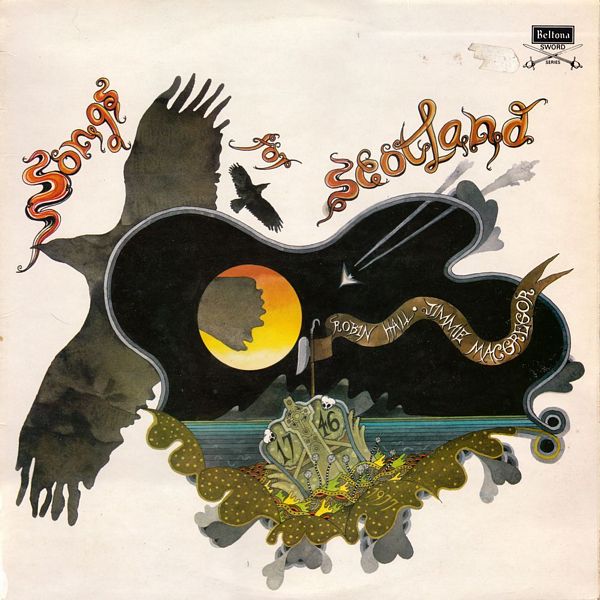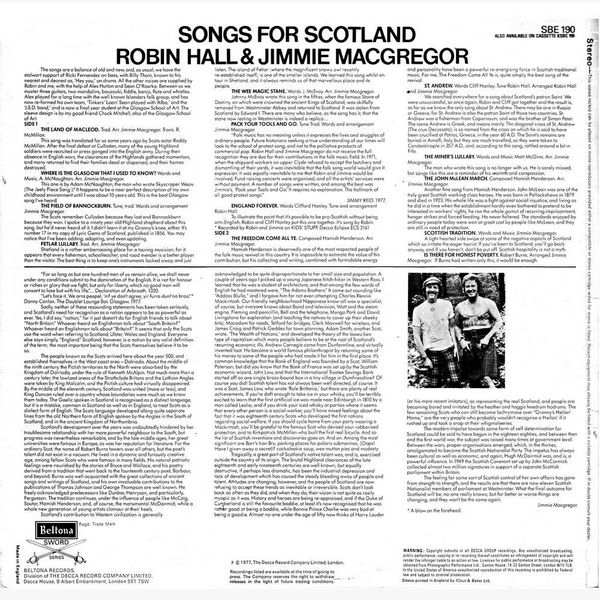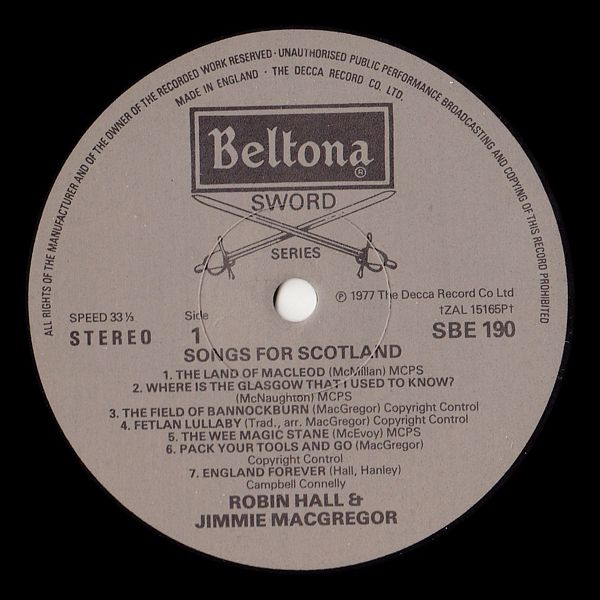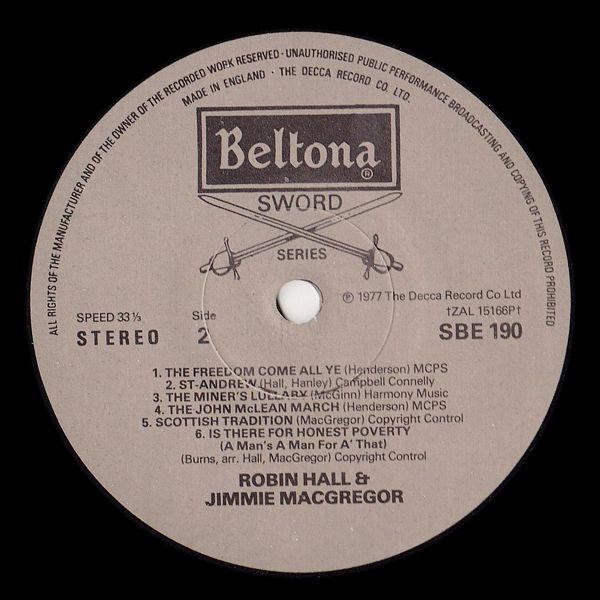

 |



|
Sleeve Notes
The songs are a balance of old and new, and, as usual, we have the stalwart support of Ricki Fernandez on bass, with Billy Thorn, known to his nearest and dearest as, "Hey you" on drums. All the other noises are supplied by Robin and me, with the help of Alex Hutton and Seán O'Rourke. Between us we muster three guitars, two mandolins, bouzouki, fiddle, banjo, flute and whistles. Alex played for a long time with the well known Islanders folk group, and has now re-formed his own team, "Tinkers' Loan". Seán played with "Alba", and the "J.S.D. band" and is now a final year student at the Glasgow School of Art. The sleeve design is by my good friend Chuck Mitchell, also of the Glasgow School of Art.
THE LAND OF MACLEOD — This song was translated for us some years ago by Scots actor Roddy McMillan. After the final defeat at Culloden, many of the young Highland soldiers were recruited or press ganged into the English army. During their absence in English wars, the clearances of the Highlands gathered momentum, and many returned to find their families dead or dispersed, and their homes destroyed.
WHERE IS THE GLASGOW THAT I USED TO KNOW? — This one is by Adam McNaughton, the man who wrote Skyscraper Wean. (The Jeely Piece Song *). It happens to be a near perfect description of my own childhood environment until I was about 10 years old. This the best Glasgow song I've heard.
* Recorded by Robin and Jimmie on KIDS' STUFF Decca Eclipse ECS 2161
THE FIELD OF BANNOCKBURN — The Scots remember Culloden because they lost and Bannockburn because they won. I spoke to a ninety year old Highland shepherd about this song, but he'd never heard of it. I didn't learn it at my Granny's knee, either. It's number 17 in my copy of Lyric Gems of Scotland, published in 1856. You may notice that I've been adding, adapting, and even updating.
FETLAR LULLABY — Shetland is a rather embarrassing place for a touring musician, for it appears that every fisherman, schoolteacher, and road mender is a better player than the visitor. The best thing is to keep one's instruments locked away, and just listen. The island of Fetlar (where the magnificent snowy owl recently re-established itself), is one of the smaller islands. We learned this song whilst on tour in Shetland and it always reminds us of that marvellous place and its people.
THE WEE MAGIC STANE — Johnny McEvoy wrote this song in the fifties, when the famous Stone of Destiny, on which were crowned the ancient Kings of Scotland, was skilfully removed from Westminster Abbey and returned to Scotland. It was stolen from Scotland by Edward I. There are many who believe, as the song has it, that the stone now resting in Westminster is indeed a replica …
PACK YOUR TOOLS AND GO — "Folk music has no meaning unless it expresses the lives and struggles of ordinary people. Future historians seeking a true understanding of our times will look to the school of protest song, and not to the palliative products of commercial pop. Robin Hall and Jimmie Macgregor do not receive the full recognition they are due for their contributions in the folk music field. In 1971, when me shipyard workers on upper Clyde refused to accept the butchery and dismantling of their yards, it was inevitable that the folk song world would give it expression. It was equally inevitable to me that Robin and Jimmie would be involved. Fund raising concerts were organised, and all the artists' services were without payment. A number of songs were written, and among the best was Jimmies 'Pack your Tools and Go.' It requires no explanation. The hallmark of all good protest songs."
JIMMY REID, 1977
ENGLAND FOREVER — To illustrate the point that it's possible to be pro-Scottish without being anti-English, Robin and Cliff Hanley put this one together. It's sung by Robin.
THE FREEDOM COME ALL YE — Hamish Henderson is deservedly one of the most respected people of the folk music revival in this country. It is impossible to estimate the value of his contribution, but his collecting and writing, combined with formidable energy and personality have been a powerful re-energising force in Scottish traditional music. For me, The Freedom Come All Ye is, quite simply, the best song of the revival.
ST. ANDREW — We searched everywhere for a song about Scotland's patron Saint. We were unsuccessful, so once again, Robin and Cliff got together and the result is, as far as we know, the only song about St. Andrew. There may be one in Russia or Greece, for St. Andrew is also the patron Saint of those two countries. St. Andrew was a fisherman from Capernaum, and was the brother of Simon Peter The name Andrew is Greek, and means manly. The diagonal cross of St. Andrew (The crux Decussate), is so named from the cross on which he is said to have been crucified at Patras, Greece, in the year 60 A.D. The Saint's remains are buried in Amalfi, Italy, but they are much travelled, as they were taken to Constantinople in 357 A.D., and, according to this song, rattled around a bit in Fife.
THE MINER'S LULLABY — The man who wrote this song is no longer with us. He is sorely missed, but songs like this are a reminder of his warmth and compassion.
THE JOHN McLEAN MARCH — Another fine song from Hamish Henderson. John McLean was one of the truly great Scottish working class heroes. He was born in Pollockshaws in 1879 and died in 1923. His whole life was a fight against social injustice, and living as he did in a time when the establishment hardly even bothered to pretend to be interested in workers' rights, he ran the whole gamut of recurring imprisonment, hunger strikes and forced feeding. He never faltered. The standards enjoyed by ordinary people today were won at great cost by people like McLean, and they are still in need of protection.
SCOTTISH TRADITION — A light hearted side swipe at some of the negative aspects of Scotland which so irritate the eager tourist. If you've been to Scotland, you'll go back anyway, and if you haven't, don't be put off. Scottish hospitality is not a myth.
IS THERE FOR HONEST POVERTY — If Burns had written only this, it would be enough.
"For so long as but one hundred men of us remain alive, we shall never under any conditions submit to the domination of the English. It is not for honour or riches or glory that we fight, but only for liberty, which no good man will consent to lose but with his life" …
Declaration of Arbroath. 1320.
"Let's face it. We arra peepel, 'nif ye don't agree, yir furra dunt'na broo." **
Danny Conlan. The Doublet Lounge Bar. Glasgow. 1977
Sadly, neither of these resounding statements has been taken seriously, and Scotland's need for recognition as a nation appears to be as powerful as ever. Yes, I did say, "nation," for it just doesn't do for English friends to talk about "North Britain." Whoever heard an Englishman talk about "South Britain?" Whoever heard an Englishman talk about "Britain?" It seems that only the Scots use the word when referring to Scotland, Ulster, Wales and England. Everyone else says simply, "England." Scotland, however, is a nation by any valid definition of the term; the most important being that the Scots themselves believe it to be so.
The people known as the Scots arrived here about the year 500, and established themselves in the West coast area - Dalriada. About the middle of the ninth century, the Pictish territories to the North were absorbed by the Kingdom of Dalriada, under the rule of Kenneth McAlpin! Not much more than a century later, the lowland areas of the Strathclyde Britons and the Lothian Angles were taken by King Malcolm, and the Pictish culture had virtually disappeared. By the middle of the eleventh century, Scotland was united (more or less), and King Duncan ruled over a country whose boundaries were much as we know them today. The Gaelic spoken in Scotland is recognised as a distinct language, but it is a mistake, common in Scotland as well as in England, to treat Scots as a dialect form of English. The Scots language developed along quite separate lines from the old Northern form of English spoken by the Angles in the South of Scotland, and in the ancient Kingdom of Northumbria.
Scotland's development over the years was undoubtedly hindered by her troublesome relationship with her more powerful neighbour to the South, but progress was nevertheless remarkable, and by the late middle ages, her great universities were famous in Europe, as was her reputation for literature. For the ordinary Scot, the name of Robert Burns towers over all others, but the poet's talent did not exist in a vacuum. He lived in a dynamic and furiously creative age, among fellow Scots who were famous in many fields. His natural patriotic feelings were nourished by the stories of Bruce and Wallace, and his poetry derived from a tradition that went back to the fourteenth century poet, Barbour, and beyond. Burns was well acquainted with the great collections of ancient songs and writings of Scotland, and his own invaluable contributions to the publications of Thomas Johnson and George Thompson are well known. He freely acknowledged predecessors like Dunbar, Henryson, and particularly, Fergusson. The tradition continues, under the influence of people like McCaig, Soutar, Hamish Henderson, and, of course, the monumental McDairmid; while a whole new generation of young artists clamour at their heels.
Scotland's contribution to Western civilization is generally acknowledged to be quite disproportionate to her small size and population. A couple of years ago I picked up a young Japanese hitch-hiker in Western Ross. I learned that he was a student of architecture, and that among the few words of English he had mastered were, "The Adams Brothers." It came out sounding like "Addass Blulla," and I forgave him for not even attempting Charles Rennie Mackintosh. Our friendly neighbourhood Nipponese know-all was a specialist, of course, but everyone knows about Baird and television, Watt and the steam engine, Fleming and penicillin, Bell and the telephone, Mungo Park and David Livingstone for exploration (and teaching the natives to cover up their cheeky bits). Macadam for roads, Telford for bridges, Clerk Maxwell for wireless, and James Craig and Patrick Geddes for town planning. Adam Smith, another Scot, wrote, "The Wealth of Nations," and developed the theory of the laissez faire type of capitalism which many people believe to be at the root of Scotland's recurring economic ills. Andrew Carnegie came from Dunfermline, and virtually invented loot. He became a world famous philanthropist by returning some of his money to some of the people who had made it for him in the first place. It's common knowledge that the Bank of England was founded by a Scot, William Paterson; but did you know that the Bank of France was set up by the Scottish economic wizard, John Law, and that the International Trustee Savings Bank started off as one single brass-bound box in a tiny village in Dumfriesshire? Of course you did! Scottish talent has not always been well directed, of course. It was a Scot, James Law, who wrote "Rule Brittania," but there are plenty of real achievements. If you're daft enough to take ice in your whisky, you'll be terribly excited to learn that the first artificial ice was made near Edinburgh in 1810 by a man called Leslie; and if you drink your iced whisky at parties where it seems that every other person is a social worker, you'll have mixed feelings about the fact that it was eighteenth century Scots who developed the first notions regarding social welfare. If you should cycle home from your party wearing a Mackintosh, you'll be grateful to the famous Scot who devised your rubberised protection, and to Kirkpatrick McMillan who built the first real bicycle. And so the list of Scottish inventions and discoveries goes on. And on. Among the most significant are Barr's Iron Bru, parking places for polaris submarines, (Oops! Hove I given away a secret)? cockaleekie soup, wee mutton pies and modesty.
Tragically, a great part of Scotland's native talent was, and is, exercised outside the country of its origin. The brutal Highland clearances of the late eighteenth and early nineteenth centuries are well known; but equally destructive, rf perhaps less dramatic, has been the industrial depression and lack of development which has caused the steady bleeding away of people and latent Attitudes are changing, however, and the people of Scotland are now refusing to accept these trends as inevitable or irreversible. Scots don't look bock as often as they did, and when they do, their vision is not quite as rosily myopic as it was. History and heroes are being re-appraised, and if the Duke of Cumberland is still the favourite boddie, at least it's now recognised that he was rather good at being a boddie, while Bonnie Prince Charlie was very bad at being a goodie Almost no-one under tie age of fifty now minks of Harry Louder (or his more recent imitators), as representing the real Scotland, and people are becoming bored and irritated by the heather and haggis heedrum hodrums. The few remaining Scots who can still become lachrymose over "Granny's Heilan' Home," are the very people who probably wouldn't recognise a Heilan' if it rushed up and took a snap at their whigmaleeries.
The modern impulse towards some form of self determination for Scotland could be said to have begun in the eighteen eighties, and between then and the first world war, the subject was raised many times at government level. Between the wars, proper organisations emerged, which, in the thirties, amalgamated to become the Scottish Nationalist Party. The impetus has always been cultural as well as economic, and again, Hugh McDairmid was, and is, a powerful influence. In 1949 the Scottish Covenant set up by John McCormick collected almost two million signatures in support of a separate Scottish parliament within Britain.
The feeling for some sort of Scottish control of her own affairs has gone from strength to strength, and the results are that there are now eleven Scottish Nationalist members of parliament at Westminster. What the final outcome for Scotland will be, no-one really knows; but for better or worse things are changing, and they won't be the same again.
Jimmie Macgregor.
**A blow on the forehead.
Jimmie Macgregor